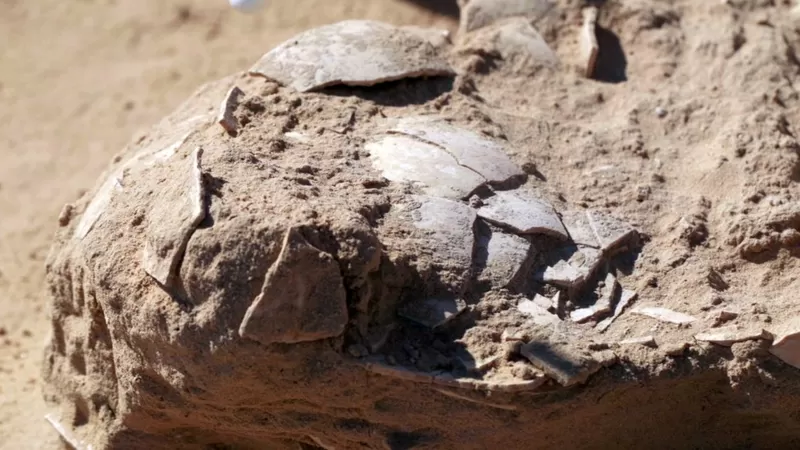Archaeologists unearth prehistoric ostrich eggs for food in Israel

Ostrich eggs were not only used as a source of food, but also as funerary utensils and luxurious tools decorated with carvings or paintings.
Archaeologists have found eight ostrich eggs that they believe are more than 4,000 years old near an ancient cooking stove pit in Israel.
The Israel Antiquities Authority said the camp site, which dates back to the prehistoric period, was used by desert Bedouins, and was discovered under the Nitzana sand dunes in the Negev region.
Excavations director Lorraine Davis said archaeologists had also unearthed stone tools and pottery fragments, but eggs were "really the highlight".
Wild ostriches were common in the region until the nineteenth century.
Scientists have found eggs of large birds in archaeological sites from different historical periods.
Ostrich eggs were not only used as a source of food, as one egg equals the same nutritional value as about 25 chicken eggs, but was also used as funerary utensils and luxurious tools decorated with inscriptions or paintings, and vessels to carry water.

The eggs are well preserved because the site was covered by sand dunes for a long time
“What is interesting is that while ostrich eggs are not uncommon in fossils, scientists have not found bones of the large bird,” said Amir Gorzalchani, of the Israel Antiquities Authority.
"It may indicate that people, in the ancient world, avoided ostriches and sought to collect their eggs," he added.
The proximity of the eggs to a cooking stove pit discovered in Bir Milka indicates that the eggs were collected on purpose for use as food.
Although the eggs are smashed, they are well preserved given that the camp site was covered with sand for a long time, as well as the dry climate conditions in the area.
"These campsites were soon covered by sand dunes, and they reappeared due to the movement of sand over hundreds and thousands of years," said Lauren Davis.
"This fact explains the exceptional preservation of eggs, which gives us a glimpse into the life of the Bedouins who roamed the desert in ancient times," she added.
Source: websites

